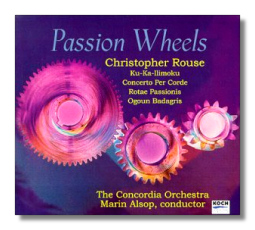
The Internet's Premier Classical Music Source
Related Links
- Rouse Reviews
- Latest Reviews
- More Reviews
-
By Composer
-
Collections
DVD & Blu-ray
Books
Concert Reviews
Articles/Interviews
Software
Audio
Search Amazon
Recommended Links
Site News
 CD Review
CD Review
Christopher Rouse

Passion Wheels
- Concerto per Corde
- Rotae Passionis
- Ku-Ka-Ilimoku
- Ogoun Badagris
Concordia Orchestra/Marin Alsop
Koch International Classics 3-7468-2 H1 55:50
Christopher Rouse has won attention in some circles for being one of the noisiest American composers around, and this CD will do little to counter that reputation. This is not restful music that the concert-goer or the CD-listener can drift off to at the end of hard day of work. When Rouse needs volume to express intense excitement or pain, he doesn't hesitate. He also asks soloists to extend their playing techniques in unusual ways. The results are always expressive and interesting, but they are not consistently comfortable, neither for musicians nor for listeners. However, that which dispels the myth among the inexperienced that classical music is a "nice" anodyne for people who need to be tranquilized is OK by me.
The disc is bracketed by Ku-Ka-Ilimoku and Ogoun Badagris, two brief showpieces for a small percussion ensemble. (Here, five athletic players cudgel the music out.) These works were written in the late 1970s when Rouse was closely associated with the upstate New York area. The former work was inspired by Hawaiian mythology. Specifically, it is a war dance. Ogoun Badagris is named for a fearsome Haitian god, a loa so implacable that only a blood sacrifice can satisfy him. In the first part, the loa is invoked through sexual rhythms driven by the congas. Then the loa invades the spirits of those present, and Ogoun Badagris comes to a crashing conclusion with the repeated shouts of the musicians. If you have friends who think drumming reached its apex with heavy metal rock, either of these works might impress them greatly.
Concerto per Corde, completed in 1990, is the most recent work here. Like Alberto Ginastera's work by the same title, this Concerto for Strings was originally a string quartet, although Rouse made changes to the materials in the process of completing the transcription. Ginastera's work, in turn, owed much to Bartók's Divertimento, and the Hungarian composer's influence also can be heard here. Bernard Herrmann's strings-only score to Psycho is another possible antecedent, as Arlo McKinnon's booklet notes remark. In any event, Rouse's Concerto per Corde is intensely, almost painfully expressive. At times it is frankly brutal, and at other times it is frighteningly pale and morbid, but it is never dull. It pushes string sound to the edge.
Rotae Passionis (1983) is Latin for "Passion Wheels." Here, Rouse was inspired by the events leading up to and including the crucifixion of Jesus Christ. The first movement, essentially an anguished concerto for clarinet (here, the remarkably brave Allen Kay) and percussion, depicts the Agony in the Garden. The soloist nervously expresses mortal doubts and fears. The second movement is a whistle-stop tour of all fourteen Stations of the Cross. Rouse almost crosses the line into parody here – definite shades of Peter Maxwell Davies's Vesalii Icones, which treats similar material like a grotesque cabaret act. There's validity to this, but it won't be for everyone.The last movement depicts Christ's slumber in death, and the music is tender but fragmented, quiet but disquieting. This is a Passion with no resurrection.
Marin Alsop is an extremely talented conductor. Her Barber series on Naxos got off to a very strong start a few months ago, and this new CD, recorded in 1997 and 1999, consolidates her reputation as a fearless interpreter. The Concordia Orchestra, a group founded by Alsop and based in New York City's Lincoln Center, plays the heck out of Rouse's music. Expression and drive are needed in this music, and also technique, and the Concordians supply these in abundance. The engineering on this CD is superb. Bravo, Koch International, for this exciting, albeit challenging release.
Copyright © 2000, Raymond Tuttle


















